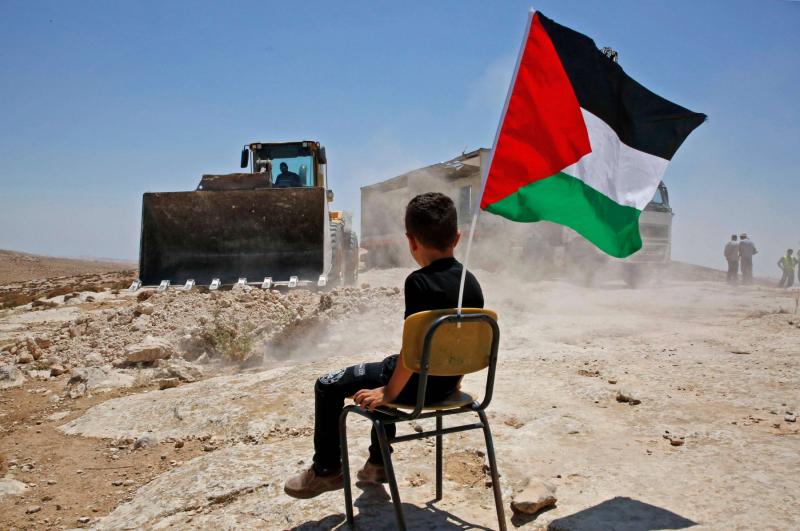Prediction is a mug’s game but there is a reasonable chance 2019 will be a rather better year for Palestinians than the previous two.
For starters, US President Donald Trump may unveil his much-hyped “Deal of the Century.” On February 8, the British parliament is to debate official recognition of Palestinian statehood.
The new year may see Spain and Ireland make good on their stated intentions to recognise Palestinian statehood. France, too, is exploring recognition. Madrid may have success with its push for the European Union as a whole to recognise Palestinian statehood.
That would make 2019 a happier year than any since 2017 when Trump entered the White House. He’s been bragging about his deal ever since but 2019 may show it is a boast too far — and a cruel belittlement of Palestinians the world won’t countenance.
Gallic exasperation with America’s increasing callousness towards the Palestinian people was apparent in September when French President Emmanuel Macron used the UN General Assembly to rebuke Trump’s “unilateral initiatives” on the Palestinian-Israeli issue.
Macron insisted the crisis could not be resolved by “trampling on the legitimate rights of the Palestinian people to legitimate peace” and added there was “no credible alternative to the two-state solution.”
The Trump “deal” won’t bring peace to the Middle East but it will end the persistent futility of hoping the United States is a peacemaker. As we shall probably learn in 2019, a two-state solution — as mapped out by the 1993 Oslo Accords — will not feature in Trump’s big-ticket “deal.” In fact, it won’t be a deal so much as a sell-out of the Palestinians creating something that has been called a “state-minus” or a pretend state.
Palestinians will probably be offered local autonomy over approximately 40% of the West Bank and that in disconnected chunks but not broad sovereign rights. Gaza would be under supposed Palestinian control but Israel would run security; most of the land, sea and air access; electricity and trade.
The Trump “deal” will serve at least one useful purpose, especially if it drops relatively early in the new year. Having blown up, once and for all, American pretensions to being an honest broker between Palestinians and Israelis, it will leave the rest of 2019 open to more serious attempts from elsewhere to alleviate the situation.
In that sense, the Trump “deal” can only be a good thing. It is best to dispense with the fiction the United States intends to deal fairly with the Palestinians considering the Trump administration no longer even bothers to conceal its extreme bias towards Israel and its determination to unilaterally dismantle the three core elements of the Oslo peace process: the status of Jerusalem, the issue of Palestinian refugees and the creation of two states.
That there is profound disagreement internationally with such a sweeping and unfair redefinition of Palestinian rights and Israeli responsibilities may become very clear in 2019. The British parliamentary vote on Palestinian statehood will probably come soon after the Trump “deal” and provide an indication of the mood in key European countries.
It’s not possible to predict the outcome of the British vote. That the bill is to be debated at all, having been tabled by the first British member of parliament of Palestinian ethnicity, says something.
Add to that the effectiveness of British-Palestinian MP Layla Moran’s reasoned and reasonable championing of the Palestinian cause. Moran, who speaks Arabic among other languages, and whose mother is a Palestinian Christian, said it is “vital” for Britain to acknowledge its role in the Palestinian-Israeli impasse.
She admitted that the United Kingdom recognising the state of Palestine “alone won’t be a solution” but said “it would go some way to reigniting the spark of hope that has gone out in the heart of Palestinians across the world.”
The Spanish, Irish and French seem to be cleaving to the same agenda, one that seeks to inject hope into a seemingly faltering movement, which powerful players are trying to bludgeon into incoherence.
Even at the end of 2018, a truly terrible year for Palestinians, their leaders are neither addled nor incapacitated by grief. On December 1, Saeb Erekat, secretary-general of the Palestinian Liberation Organisation and chief negotiator, bullishly declared the White House “requires giant statesmen not real estate agents.”
It was a statement of Palestinian disdain for Trump, a real estate developer, and his chief Palestinian-Israeli deal-maker, son-in-law Jared Kushner, whose speciality also is property.
Disdain is good at this point. It allows the Palestinians — for all their fragmentation — to unite around a shared idea of justice and inalienable rights.
That parts of the world beyond the United States may join with the Palestinians in 2019 will mean a happier new year.


